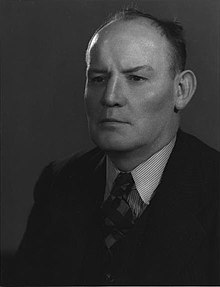Rowley James
Rowley James | |
|---|---|
 | |
| Member of the Australian Parliament for Hunter | |
| In office 17 November 1928 – 14 October 1958 | |
| Preceded by | Matthew Charlton |
| Succeeded by | H. V. Evatt |
| Personal details | |
| Born | 14 June 1885 Lambton, New South Wales |
| Died | 4 July 1962 (aged 77) Ashfield, New South Wales |
| Nationality | Australian |
| Political party | Labor (1928–31) Lang Labor (1931–36) Labor (1936–58) |
| Spouse | Gladys Mary Davies |
| Children | Bert James |
| Occupation | Miner |
Rowland "Rowley" James (14 June 1885 – 4 July 1962) was an Australian politician and coalminer. Born at Lambton, New South Wales, the son of a Welshman (Moses James), he was educated at a government school and worked in the mines for twenty-five years (including a five-year stint in Western Australia). On 24 July 1912 he married Gladys Mary Davies. Having served the Collie River District Miners' Union of Workers, he returned to New South Wales to become part of the Australasian Coal and Shale Employees' Federation.
James was elected to the Australian House of Representatives for the Australian Labor Party in 1928, succeeding former Labor leader Matthew Charlton in the seat of Hunter. He was a critic of both the conservative government of Stanley Bruce and the Labor government of James Scullin for not prosecuting mine-owners during the protracted miner lock-out in northern New South Wales (1929–30), which led to accusations of inciting mob violence; Smith's Weekly published his record of convictions, including drunkenness and assaulting police.
A supporter of Jack Lang's proposal that New South Wales should not repay interest to British bond-holders in the height of the Great Depression, James joined Jack Beasley's Lang Labor Party, along with six other New South Wales MPs, who voted in opposition to defeat the Scullin government. At the ensuing elections, both Labor parties lost heavily but James easily retained his seat.
Re-admitted to the ALP in 1936, James was chairman of the parliamentary standing committee on public works from 1943, and led the Australian delegation to the first International Labour Organisation coal-mining committee in London in 1945. He continued to be prominent in coal-mining affairs, and his support for Prime Minister Ben Chifley's stand on the 1949 coal strike prompted some to express a desire to expel him from the Miners' Federation.
A man who disliked convention, James was succeeded in the seat of Hunter in 1958 by ALP leader H. V. Evatt, who was in turn succeeded by James' son Bert. James died on 4 July 1962 in the Sydney suburb of Ashfield, and was survived by his wife, daughter and three of his five sons.
References
- Fredman, L. E. (1996). "James, Rowland (Rowley) (1885-1962)". Australian Dictionary of Biography. Canberra: National Centre of Biography, Australian National University. ISBN 978-0-522-84459-7. ISSN 1833-7538. OCLC 70677943. Retrieved 25 August 2007.
